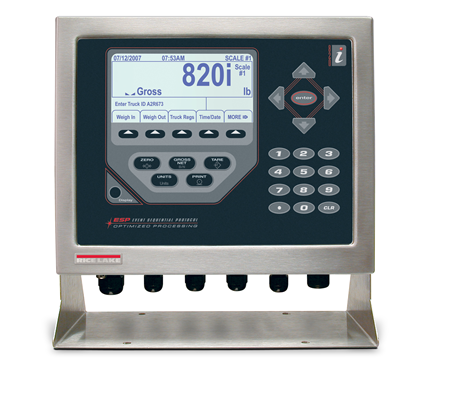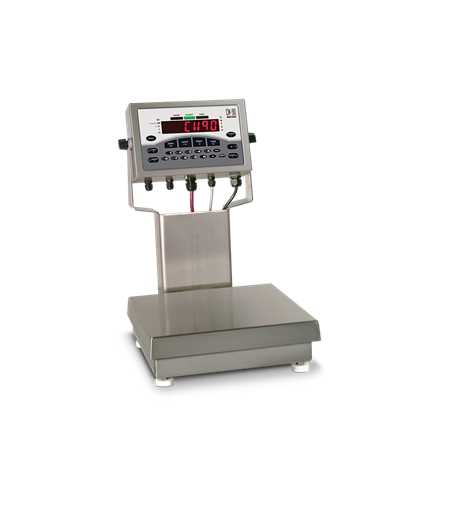Is the website displaying in the correct language? Please confirm or select a different language.
Your region has been set automatically. Please confirm or select a different region.
Prince Edward Island
The 820i , CW-80 and BenchMark land the biggest catch in the mussel industry.
Gerald Sulivan, president of Mari-Tech Scales & Food Equipment Inc. in Nova Scotia, along with co-owner Stewart Greig, have been Rice Lake distributors since they launched the company 11 years ago. Gerald is taking us to see Rice Lake equipment applications on Prince Edward Island.
There is only one way to get there, and that’s the beautiful Confederation Bridge that spans the Northumberland Strait, linking Prince Edward Island with mainland New Brunswick. The 12.9 kilometer (8 mile) long multi-span post-tensioned concrete box girder structure took 5,000 laborers four years and $1.3 billion to build. The grand opening in 1997 was a Canadian national celebration.
The estimated lifespan of the bridge is 100 years or more. The rock-filled causeway that was originally proposed would not have lasted long in this passage. The Canadian Hydrographic Service estimates that tidal currents through a gap in such a causeway would be in excess of 18 knots (33.3 km/h/20.7 mph). That’s powerful enough to counter most commercial ships and sweep away house-sized boulders. The Northumberland Strait is also ruled by an extremely complex tidal regime. The tidal cycles on each side of such a causeway would be placed at opposites to each other.
The sheer size and weight of the components required strengthening the soil base at the staging facility. A crawler transport system was used to move pieces from fabrication to storage, and onto a nearby pier. The Danish-built heavy-lift catamaran, the HLV Svanen, was brought in to place the components in the Strait. What a sight that must have been. The Svanen was, and would still be, the tallest man-made structure on this windswept province.
Borden-Carleton
The Confederation Cove Musel Company Ltd. — CCMC is conveniently located at the island foot of Confederation Bridge, on the site of the old ferry landing in Borden- Carleton. CCMC processes one quarter, or approximately 9,000,000 pounds, of the island’s annual mussel harvest. They buy from 50 mussel farms surrounding Prince Edward Island, where cultured mussels are grown in mesh socks that are suspended from backlines (ropes) in the water. These ropes are anchored at the bottom and suspended using plastic buoys for floats. It takes one year for the “spat” to reach market size. Then the ropes are pulled into the boat with a winch and pulley, and the mussel-filled socks are removed. (Unlike wild fishery, mussel farming is environmentally friendly; they do not drag the ocean floor to harvest mussels.)
The Northumberland Strait is one of the most productive marine environments in the world, especially for mussels. The quality of water the mussels inhabit makes all the difference in the taste, and Prince Edward Island Blue Mussels are said to be the sweetest-tasting mussels in the world.
A mussel filters ten to fifteen gallons of seawater a day to extract plankton for nutrients, which in turn improves the coastal water quality. No feed or chemicals are used as with other forms of aquaculture. These same tidal waters that can move housesized boulders also constantly replenish the food supply mussels need to taste sweet and grow to market size.
Len Currie, CCMC general manager, says each island cove produces mussels with a distinctive flavor. “We do all we can to preserve that natural flavor, so we can’t afford to have any part of our process or equipment break or slow down. Our fresh mussels are shipped out every day. We hold our mussels in their natural environment until the orders are received. Only after receiving the order will the processing and packing begin. This gives our customers the freshest quality with minimum order lead time.”
Customers can also order their mussels frozen. First they must be blanched to 160 degrees, a process that releases the meat from the shell. Some customers want their order completely cooked (to 180 degrees) before being flash frozen. Len observes, “Since being introduced to Rice Lake equipment it has become the standard to which we measure the performance, user-friendliness and serviceability of other equipment in our plant.” And Mari-Tech? “Mari-Tech continues to be the leader in addressing our equipment or service needs.”
CCMC uses Rice Lake’s CW-80 Checkweigher throughout their operation and especially in their quality assurance lab to verify the yield of meat from each batch. First the raw test mussels are weighed. Then the mussels are removed from the shells and weighed again. After the weighing, the technician sautéed the mussels in butter and we conducted a taste test. Sweet!
Subscribe to Rice Lake Magazine
Sign in or create a Rice Lake website account to request a Rice Lake Magazine filled with application stories like this one be sent to you.
Account Sign In Create an Account


 My Account
My Account



